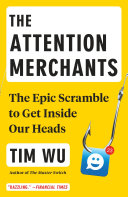

In 'The Attention Merchants', Tim Wu explores the evolution and implications of the attention economy, where attention has become a valuable commodity. The book delves into the historical progression of attention merchan...
Continue readingIn 'The Attention Merchants', Tim Wu argues that attention has become a prized commodity in the modern economy. Just like oil or gold, attention can be extracted, refined, and sold. This idea traces back to the early day...
Continue readingWu delves into the history of attention merchants, tracing their evolution from the early print media to the digital age. He highlights key milestones, such as the rise of newspapers in the 18th century, which began sell...
Continue readingWu examines the psychological effects of living in an attention economy, where individuals are bombarded with information and stimuli vying for their focus. This constant distraction can lead to a fragmented attention sp...
Continue readingOne of the most significant advancements in the attention economy is the use of algorithms to capture and maintain user attention. Wu explains how platforms like Facebook and Google employ sophisticated algorithms that a...
Continue readingWu speculates on the future of the attention economy, considering potential developments and their implications for society. He discusses the possibility of a backlash against the overwhelming nature of digital media, as...
Continue readingThe ethical considerations surrounding the attention economy are a central theme in Wu's analysis. He raises critical questions about the responsibilities of attention merchants in shaping public discourse and the potent...
Continue readingFinally, Wu emphasizes the importance of awareness and critical thinking in navigating the attention economy. By understanding the mechanisms at play in the commodification of attention, individuals can make more informe...
Continue readingThe reading time for The Attention Merchants depends on the reader's pace. However, this concise book summary covers the 7 key ideas from The Attention Merchants, allowing you to quickly understand the main concepts, insights, and practical applications in around 21 min.
The Attention Merchants is definitely worth reading. The book covers essential topics including The Concept of Attention as a Commodity, Historical Evolution of Attention Merchants, The Psychological Impact of Attention Economy, providing practical insights and actionable advice. Whether you read the full book or our concise summary, The Attention Merchants delivers valuable knowledge that can help you improve your understanding and apply these concepts in your personal or professional life.
The Attention Merchants was written by Tim Wu.
If you enjoyed The Attention Merchants by Tim Wu and want to explore similar topics or deepen your understanding, we highly recommend these related book summaries:
These books cover related themes, complementary concepts, and will help you build upon the knowledge gained from The Attention Merchants. Each of these summaries provides concise insights that can further enhance your understanding and practical application of the ideas presented in The Attention Merchants.